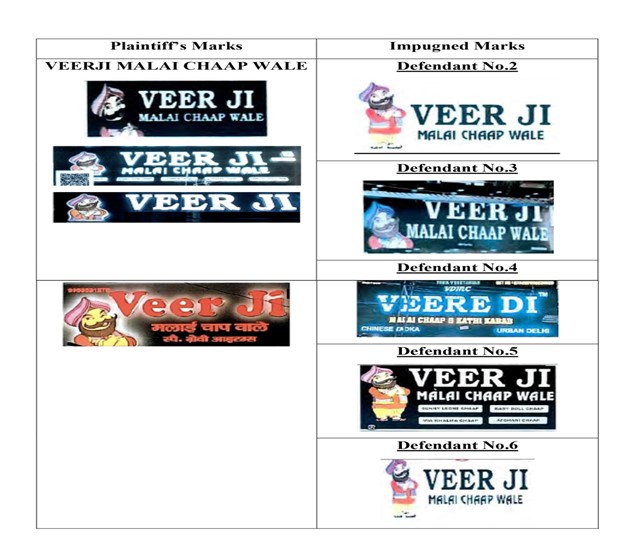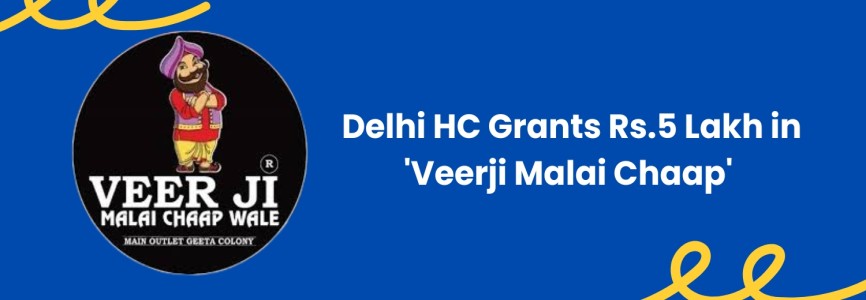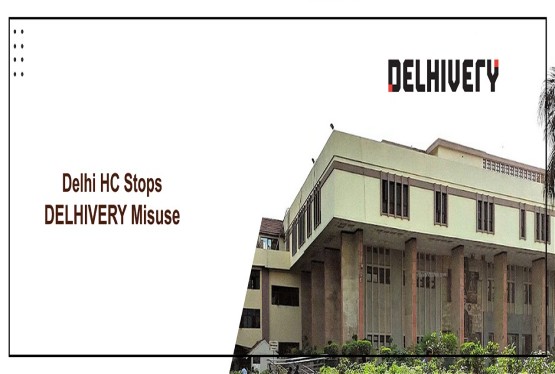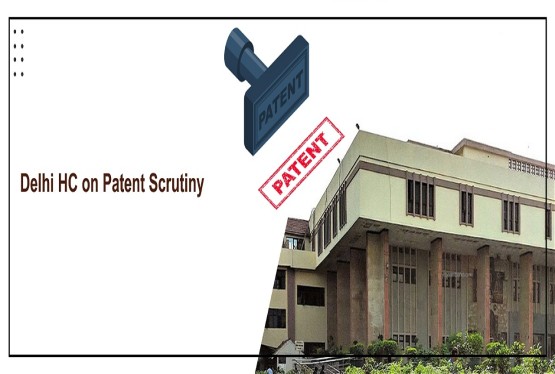Background of the Case
In December 2022, the plaintiff originally operating as “Veerji Malai Chaap Wale” since 2016 and incorporated as MS Veerji Restaurant Private Limited in November 2020 filed a suit before the Delhi High Court. The plaintiff alleged that multiple eateries across Bhopal, Delhi, Moradabad (UP) and other locations were infringing its registered trademarks: “VEERJI MALAI CHAAP WALE” and “VEERE DI MALAI CHAAP WALE”, including their associated device marks. These defendants marketing under names like “Veer Ji Malai Chaap Wale”, “The Veer Ji Malai Chaap Wale”, and “Veere Di Malai Chaap & Kathi Kabab” had listed themselves on prominent delivery platforms such as Zomato and Swiggy, using nearly identical logos and visual branding to the plaintiff’s. While the plaintiff had established extensive goodwill through approximately 70 outlets nationwide and robust online promotion, the defendants continued operating despite an interim injunction and cease notices. As five defendants failed to appear or respond to summonses, the Court proceeded ex parte, treating all allegations as admitted.
Court Findings & Observations
The Delhi High Court, presided over by Justice Amit Bansal, made several critical findings in favor of the plaintiff, MS Veerji Restaurant Private Limited, as detailed below:
No Appearance by Defendants
Despite being served with summons and an earlier interim injunction, five of the six defendants failed to file any written statements or appear in court. As a result, the Court proceeded ex parte, and all allegations in the plaint were deemed to be admitted.
Passing off
A central feature of the Delhi High Court’s reasoning was its clear and decisive finding of passing off. The Court held that the plaintiff had established a robust reputation and goodwill in its mark “Veerji Malai Chaap Wale”, built through extensive brand use, approximately seventy national outlets, significant online presence, and sustained promotion. It observed that the defendants deliberately adopted confusingly similar names like “Veer Ji Malai Chaap Wale” and “Veere Di Malai Chaap & Kathi Kabab” together with near-identical visual label designs on platforms such as Zomato and Swiggy. Such conduct, the Court concluded, amounted to a dishonest adoption intended to mislead the public and unfairly exploit Veerji’s established identity and consumer trust. Justice Amit Bansal emphasized that this misuse not only infringed statutory rights under the Trade Marks Act and Copyright Act but also constituted a clear case of passing off, since consumers were likely to believe the defendants’ services were associated with the plaintiff a classic “trinity test” scenario confirming goodwill, misrepresentation, and likely damage to the plaintiff.
Trademark Infringement And copyright infringement
The Court observed that the defendants were using names and branding such as “Veer Ji Malai Chaap Wale”, “The Veer Ji Malai Chaap Wale”, and “Veere Di Malai Chaap & Kathi Kabab” which were either identical or deceptively similar to the plaintiff’s registered trademark “VEERJI MALAI CHAAP WALE” and its device marks. These actions were found to constitute both trademark infringement and copyright infringement (for copying the artistic label), misleading the public into associating the defendants’ operations with the plaintiff’s established brand
Relevant Statutes & Legal Provisions Applied
The Delhi High Court’s decision rested significantly on Order-XIII-A of the Code of Civil Procedure, 1908, as introduced by the Commercial Courts Act, 2015. This provision authorizes a court to grant summary judgment in commercial disputes especially intellectual property suits without recording oral evidence, if it determines that one party has no real prospect of defending the claim and there is no other compelling reason for proceeding to trial. In this case, Justice Amit Bansal noted that 4 defendants failed to appear or contest the claims, and no material facts were in dispute. Consequently, the Court found it justifiable to dispose of the suit summarily and issue a final decree without a full trial.
Further, the judgment invoked Section 135(1) of the Trade Marks Act, 1999, which empowers courts to issue both a permanent injunction as well as either damages or an account of profits, at the plaintiff’s election in cases of trademark infringement. Here, the plaintiff opted for damages, and the Court awarded Rs.1 lakh per defaulting defendant totaling Rs.5 lakh underlining the statutory authority behind such relief.
Simultaneously, the Court addressed the doctrine of passing off, reinforced by statutory protection under the Copyright Act for the plaintiff’s artistic label. Since the defendants had misappropriated both the registered word marks and the copyrighted device branding, their actions were treated as misleading the public, constituting a valid claim for passing off compounded by copyright infringement.
Court Observation
In its decision dated 8 May 2025, the Delhi High Court relied heavily on Order XIII-A of the Code of Civil Procedure, 1908, which was introduced through the Commercial Courts Act, 2015. This provision allows courts to issue a summary judgment when one party does not contest the suit, there are no factual disputes, and it is evident they have no real prospect of successfully defending the claim. Justice Amit Bansal observed that since the defendants (no. 2 to 6) neither appeared in court nor filed any written statements, all allegations in the plaint were deemed admitted. In such circumstances with no need for oral evidence the Court held that a final decree could be granted straightaway without proceeding to a full trial.
Further, the Court invoked Section 135(1) of the Trade Marks Act, 1999, which empowers courts to grant an injunction and either damages or an account of profits, at the plaintiff’s choice. In this case, the plaintiff opted for damages, and the Court awarded Rs.1 lakh to each of the five defaulting defendants, thus totaling Rs.5 lakh in favor of the plaintiff.
Moreover, the Court addressed the doctrine of passing off, emphasizing that the defendants had misappropriated both the word mark and the plaintiff’s artistic label design thereby misleading consumers and unfairly profiting from the plaintiff’s goodwill. This approach affirmed that statutory remedies under the Trademark Act and the Copyright Act can operate alongside common-law rights to guard against deception and brand misuse.
Visual Comparison of Branding

Legal Impact
The Delhi High Court’s landmark decision in favor of Veerji Malai Chaap Wale underscores the judiciary's resolve to uphold intellectual property rights especially for domestic brands against digital-era infringement. By granting a summary judgment under Order XIII-A CPC, Justice Amit Bansal demonstrated that non-appearance and absence of defense allow courts to bypass full trials in commercial disputes, streamlining legal proceedings.
This ruling is particularly significant for brand owners in the food and hospitality sector, emphasizing that online presence via delivery platforms such as Zomato and Swiggy, along with visible digital branding, can establish substantial goodwill and reputational rights. It sends a clear warning that using deceptively similar names and visual designs to enhance visibility on these platforms constitutes serious infringement and may trigger swift judicial intervention even in the absence of oral evidence.
Moreover, the judgment reinforces that passing off and copyright misuse claims can be upheld where defendants copy both word marks and artistic labels. The Court’s award of Rs.5 lakh—Rs.1 lakh to each defaulting defendant under Section 135(1) of the Trade Marks Act signals that courts will not only grant injunctions but also meaningful monetary relief to deter bad-faith imitators.
Overall, the Veerji judgment sets a powerful precedent: infringers cannot evade litigation by remaining silent. Courts are empowered to deliver decisive outcomes efficiently, ensuring that lawful brands are protected and that justice is not delayed by procedural non-cooperation.
Conclusion
In its order dated 8 May 2025, the Delhi High Court conclusively held that the defendants’ unauthorized use of deceptively similar names and branding constituted clear-cut trademark infringement and passing off. Since some of the defendants neither appeared nor filed any defense, all their allegations were deemed admitted. Citing the provisions of Order XIII-A CPC, the Court granted summary judgment, bypassing a full trial and issuing a final decree. It imposed a permanent injunction, restraining the defendants from using the infringing marks, and awarded a total of Rs.5 lakh in damages and costs, with Rs.1 lakh levied on each defaulting party.
Justice Amit Bansal emphasized that creating brand confusion to exploit a reputed trademark even via online delivery apps amounts to dishonest adoption. This judgment sets a robust precedent: silence or non-cooperation in litigation does not insulate infringers but instead enables swift judicial relief and financial penalties. It underscores the judiciary's commitment to protecting brand identity effectively, particularly in the digital age.






























_(b)_of_the_Trademark_Act,_1999_(1)_crop10_thumb.jpg)



_crop10_thumb.jpg)




























_crop10_thumb.jpg)
_crop10_thumb.jpg)






_crop10_thumb.jpg)








_crop10_thumb.jpg)



_crop10_thumb.jpg)





























_crop10_thumb.jpg)

















_crop10_thumb.jpg)






_crop10_thumb.jpg)












































































































































_crop10_thumb.jpg)




































_crop10_thumb.jpg)












_crop10_thumb.jpg)















































_crop10_thumb.jpg)



































































































